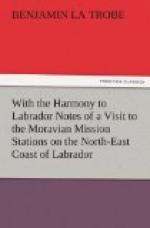Inspection of the premises, stores, archives, &c., continued conferences, and other businesses filled up the remaining days of the week during which the “Harmony” lay at anchor near the station. Meanwhile the disembarking and embarking of her outward and homeward cargoes went on, and when she was ready to sail we were ready to go northward with her. In the intervals of daily duty I enjoyed pleasant walks and talks with one or another member of the mission band in the extensive plantation behind the station, the growth of more than a hundred years of careful cultivations, Not till Saturday did we find time for more distant expeditions, when grand views rewarded our ascent of two hills to the north and south of the Nain Bay. They are about 700 or 800 feet in height.
Most of the week the majority of the natives were away fishing, but several of the men and boys were earning daily wages by assistance with the cargo. For those at the station evening services were held in the church. These varied in character, one was a singing meeting, another a liturgy, a third a Bible reading, when the two last chapters of II. Corinthians were the portion of Holy Scripture taken in course. When there was no Eskimo service, the mission family and their guests met in their dining-room for mutual edification with the German Bible and hymn-book. As to the latter, by the way, the book itself was seldom needed, for most of the company knew the hymns by heart. So the week sped away, bringing the Sabbath again.
Sunday, August 26th.—The Church Litany, and not the so-called “Catechism Litany,” was used at the 9 o’clock service. At 10 A.M. Mr. Dam preached with fervour on the text for the day, John X. 16, of course in Eskimo. The sermon was followed by the baptism of little Esther, the infant daughter of Joash and Wilhelmina. After the service the parents passed me on their way home. But where is the baby? Nowhere visible, but the hood on the mother’s back is bulky and moves.
At three o’clock I conducted the usual English service on the deck of the “Harmony.” A good many natives were present, rather out of curiosity than as able to understand, though it is astonishing to find how many have managed to pick up a little English, especially at the southern stations.
At five we again gathered in the church for a short Eskimo liturgy of praise to the Triune God, when our vessel and her passengers were commended to the renewed care of the faithful Creator. Our evening meal, the last in this hospitable mission-house, was followed by farewell words and some commendatory hymns in German. Then we “parting guests” went on board the “Harmony,” accompanied by most of our hosts, who lingered long with us. As we got into the boat, the Eskimoes bade us an affectionate good-bye, “Aksunai, aksuse.” (Aksunai, Be thou strong, or its plural, Aksuse, Be ye strong, are used both for “How do you do?” and “Good-bye.”)




